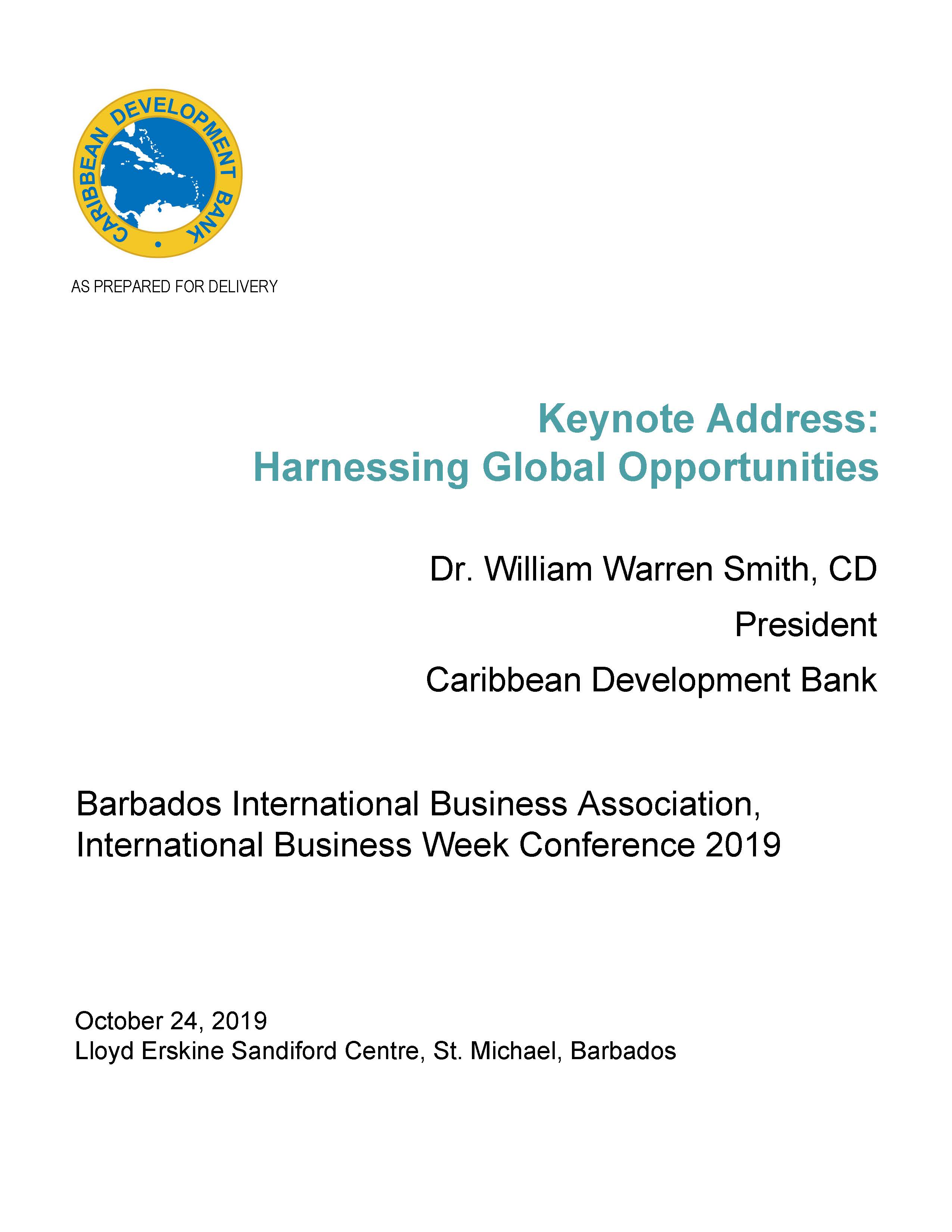Harnessing Global Opportunities
St. Michael,
Barbados

A pleasant good morning to everyone.
Let me start by thanking BIBA for inviting me to deliver the keynote address at this morning’s event and by congratulating your association on celebrating 20 years of service to your members.
I also commend BIBA for its role in information dissemination, advocacy on behalf of its members and other stakeholders, and in encouraging debate on issues of critical importance to the international business and financial services sector.
BIBA continues to be relevant and responsive to the needs of its constituents; and this is certainly exemplified by the choice of topics being covered by this year’s conference – technology advances, blockchain, the regulatory framework, and emerging opportunities.
I wish to place the international business and financial services sector within the context of the United Nations’ Sustainable Development Agenda, to which all CARICOM countries are signatories. The Agenda represents a global blueprint for ending poverty, achieving a level of human development that is fair and inclusive, and offering a more sustainable future for all by 2030.
For us in the Caribbean, achievement of this goal will undoubtedly be a function of economic transformation, which involves a deepening of the diversity and complexity of the domestic economy.
All CARICOM countries are essentially small and highly open economies. Currently, most of what defines our standards of living is imported and has to be financed with commensurate foreign exchange earnings. Therefore, to afford sustainable improvements in standards of living, we must earn foreign exchange through prolonged export growth.
Sustained export growth also requires diversity in exports so as to avoid the stops and starts that usually characterise small economies with high export concentration.
Economic transformation, therefore, takes on an additional dimension in small economies, which includes increasing the diversity and complexity of exports to reduce income volatility.
The international business and financial services sector, including its myriad direct and indirect benefits to our small economies, is representative of the required mix of diversity and complexity.
I am of the view that, for the most part, the role of the public sector is to provide policies, institutions and regulatory frameworks that facilitate growth and development. It is the private sector, however, that is the engine of growth, providing jobs, and earning foreign exchange through exports.
This morning I propose to make three simple points.
First, the international business sector, albeit small relative to other productive and export sectors in most CARICOM countries, does have unrealised potential.
Second, in the current regional and global environment, markets are continually transforming, creating new obstacles as well as new opportunities. We must be able to move with alacrity in order to circumvent the obstacles and take advantage of these opportunities.
Third, our Region should embrace a regional approach that supports regulatory convergence and the adoption of common principles among CARICOM countries.
Let us look at each of these points more critically.
The Caribbean’s offshore financial centres are essentially booking centres. By this I mean that financial intermediation takes place between non-residents. These centres are small by international standards, accounting for only 7% of global portfolio flows. However, they are large in relation to the host countries, and account for a sizeable proportion of gross domestic product, foreign exchange earnings, government revenue, and high quality employment for many Caribbean countries.
In Barbados, the international business and financial services sector is a major source of foreign exchange, ranking second only to tourism, and directly injects the equivalent of 9% of GDP into the domestic economy through the payment of taxes and operational expenditures in 2016.
Whilst being important at the national level, Barbados remains a small player in the regional offshore financial services sector and accounted for less than 1% of portfolio liabilities as at June 2016.
According to the IMF, the number of companies peaked at around 5,000 between 2012 and 2015, but by March 2017, had decreased to around 4,000.
At 3% of the labour force in 2016, the international business and financial services sector is also a small but meaningful contributor to employment in Barbados.
There is also evidence that the sector brings significant indirect benefits by encouraging foreign direct investment into host countries, and facilitating knowledge transfer and the increased sophistication of the domestic financial sector. It also galvanises faster growth in related industries such as insurance companies, finance companies, accounting and legal firms, hotels, and telecommunication companies.
Over the last three decades, international investment inflows have transitioned away from the more developed metropolitan areas into emerging market and developing economies. In fact, according to a recent OECD report, since 2010 developing countries
have accounted for a larger intake of foreign direct investments than their more established counterparts1. But, the growing attractiveness of these economies to multinational corporations has come at a price, bringing them increased visibility and greater scrutiny.
Recent exposés on the operations of offshore enterprises highlighted that almost 40% of all foreign direct investments were artificial flows of funds into tax havens. Alarmingly for the Caribbean, the OECD calculates that three Caribbean economies, including the Cayman Islands and the Virgin Islands (BVI) which are borrowing member countries of CDB, are part of a group of eight countries2 accounting for 85% of world investment in special purpose entities.
Clearly, not all of these holdings are the result of efforts at tax evasion. Nevertheless, global policy makers remain vocal that the opportunities for evasion must be reduced. In this regard, the pressure to improve the structure of international taxation has intensified, in recent years.
The United States of America, the European Union, and the Organisation for Economic Cooperation and Development (OECD) have been most active in the introduction of new regulations around the international flow of funds. The OECD enacted major changes to its reform of the regulatory environment in the 1990s. After spending much of the previous decade focusing on deregulation and open market access, it has now shifted its attention more to quality management. This management targets specific improvements in the efficiency, flexibility and simplicity of regulatory rules and procedures.
Recent adjustments to the global regulatory environment recognises transparency as a critical element of reforms to the international business community. The call for transparency has grown much louder in light of occurrences, such as the Panama Papers. The United States’ Foreign Account Tax Compliance Act and the OECD’s Common Reporting Standard seek to address the lack of information on multinational entities and foreign tax payers.
These reforms are not without criticism. The regional and international communities viewed some of these new rules as highly invasive and infringing on sovereign rights. Additionally, the presence of different agencies, rules and guidelines places a bureaucratic burden on governments and institutions. Nonetheless, many countries reacted to the international pressures and amended their regulatory frameworks to avoid losing correspondent banking relationships or being ‘blacklisted’ by external partners.
Since the recent threats of ‘blacklisting’ Barbados, many Caribbean countries are even more aware of the pressures that the international community can exert on the international business and financial services sector. A clear and concise vision that is adaptable and responsive to the changing needs of international markets becomes even more imperative in this current environment. Against this background, and to ensure the continued development of its important IBFS sector, Barbados will also need to address pertinent issues regarding competitiveness and regulation.
The attractiveness of a country to new investors requires an enabling environment that offers opportunities and minimises hindrances to business activities. The International Business and Financial Services sector is still highly attractive to multinational investments. However, with other developing countries also striving to access an increased share of foreign inflows, Barbados must continually review its policy interventions in order to keep pace with the global market place.
In the last seven years (2013-2019), its ranking on the Ease of Doing Business Index fell to 129 out of 190 countries from 88 out of 178 countries. In comparison to other countries that were ranked, Barbados needs to pay particular attention to improving investor protection, contract enforcement and cross-border trading. These areas are critical for the activities of the international business community and, as such, require urgent attention by policy makers.
The modern digital world makes for increased mobility of capital and personnel, this at an even more rapid pace than proponents of globalisation first imagined.
In light of this, and to attract multinationals and highly qualified labour, small developing countries, such as Barbados, must provide appropriate regulation and institutional support to prospective investors.
Recent amendments to the Foreign Exchange Controls Act are a step in the right direction; but this requires complementary policies and institutional strengthening to ease the process of relocation and resettlement. Allowing easy inputs of foreign labour will serve to improve, train and upskill the local content of the workforce. Such a competitive and global market requires frequent knowledge transfusion and upgrading to better use new technologies and adopt modern practices.
Digital transformation is the new nexus for growth and development. The road to recovery, the road to success and the road to a new frontier demand resilience, strength and discipline. Barbados must adopt the technology of tomorrow – today. We are already seeing the efforts in this light with the modernisation of public sector service delivery. But, ladies and gentlemen, we know that much more needs to be done.
To attract more investors and to grow the competitiveness of this industry, there needs to be greater focus on facilitating modern payment systems and its regulation, as well as monitoring and reporting of activities in the sector.
Some of the main areas which can be enhanced by modern digital technology include:
- the domestic payment systems, with the appropriate regulatory framework and oversight;
- Data collections to feed into national and international reporting requirements; and
- Updated and well maintained website for the sector.
The importance of the sector being agile and responsive cannot be understated. Following the passage of the USA’s Foreign Tax Compliance Act (FACTA) in 2010 and the OECD’s Common Reporting Standard (CRS), regional institutions faced a burdensome and costly exercise of changing reporting standards.
Delays in meeting the requirements and the resulting de-risking process led to the loss of correspondent banking relationships for some Caribbean countries. For example, only one-fifth of the domestic and international banks in Belize now have correspondent banking relationships with full banking services. Not as severe, but still impactful, six institutions in the Bahamas lost their CBRs; and this represents close to one fifth of total banking system assets.
There are a number of lessons from the successes of other offshore financial sectors that have maintained relatively strong, competitive positions, despite facing similar threats. For example, the BVI has a robust and flexible regulatory framework, reinforced by highly competent professionals. Its legal system, which includes a commercial court and strong insolvency legislation, is also geared towards supporting the BVI’s specific niches.
Like BVI, Barbados needs to craft a comprehensive strategy based on the identification and exploitation of niche areas.
An improved business eco-system is as essential for the growth of the international business and financial services sector, as it is for the rest of the economy.
Barbados has taken some notable steps to reduce its taxes; and these should have a positive impact on its competitiveness. Effective January 1, 2019, Barbados became one of the first countries in the Caribbean to converge its domestic and international tax rates, and to implement its revised tax regime. In doing so, it also became compliant with the OECD Base Erosion and Profit Shifting Action 5 Initiative addressing harmful tax practices.
Other areas requiring priority attention for improvement include the incorporation of companies, issuing of licenses, construction and work permits, and tax clearance certificates.
I turn now to my final proposition - that we should embrace a regional approach that supports regulatory convergence and the adoption of common principles among CARICOM countries.
Undoubtedly, blacklisting still remains a persistent threat to CARICOM States, particularly since the European Union intends to use a similar strategy to address concerns about AML/CFT regimes and the citizenship by investment programmes of third states. Additionally, the USA continues to include most CARICOM Member States on its list of major money laundering jurisdictions. This fuels the perception that the Caribbean is ‘high-risk’, thereby making the entire Region a target for the de-risking strategies of global banks.
In this business, what we trade on is our good name. The blacklisting of any one Caribbean country will have an immediate negative effect on the reputation of the entire Region. This underscores the need for a regional approach and the embrace of common principles by CARICOM countries.
Recognising that there is strength in numbers, the Thirtieth Inter-Sessional Meeting of the Conference of Heads of Government of the Caribbean Community reached agreement on a Community Strategy to address blacklisting. This strategy encompassed a number of immediate advocacy actions as well as the targeting of Member States’ future relations with Europe.
For instance, the actions included advising the European political leadership of the concerns of CARICOM Member States on the EU blacklisting strategy. This joint approach to advocacy and dialogue is to be commended. At the very least, it raised awareness and elicited a measure of solidarity from the African, Caribbean and Pacific grouping.
I want to challenge us to go even further as our current regional strategy still seems undergirded by individual and reactionary responses to what essentially is a regional threat. With the ongoing challenges to the offshore sector, there is clear need for a transition from a policy focus that is simply defensive to one which sets us on a course of sector sustainability.
The policy shift of which I speak is based on the evolution of a more strategic and long- term approach that emphasises regulatory convergence. Its ultimate goal is the establishment of the Caribbean as a zone of excellence and of best practice for the international business and financial services sector.
I wish to make it very clear that by referring to convergence I am by no means suggesting the cloning of our offshore sector, resulting in sameness for every jurisdiction. In fact, the main attraction of our Region is characterised by the specialisations that have evolved over time.
My proposal, then, is that we should strive for agreement on minimum standards for compliance and best practice. This approach would still allow countries to pursue the sub- sectors in which they have a competitive advantage. At the same time, we will be declaring to the rest of the world that when you opt to do business with a Caribbean offshore centre, you are choosing the best region in which to do so.
Leveraging our highly successful approaches to functional cooperation at the regional level, we can also create a platform for dialogue with and engagement of the Region’s wider private sector. The private sector can thereby assume a larger role in shaping the codes, rules and operating procedures. There is also considerable benefit to be gained from pooling expertise in the area. In this way, we could create a formidable “think tank” charged with leading research and advising on policy coordination, including our response to and mitigation of threats.
Ladies and gentlemen, I want to lend my voice in support of the recently endorsed CARICOM Action Plan on Statistics. This action plan will get us the data on which we can formulate relevant and responsive policy.
In closing, I return to my opening bias towards a larger role for the private sector in transforming Caribbean countries. A regional approach tied to better use of our private sector provides an immediate and effective growth strategy for our small, open, developing economies.
There is untapped potential in the Caribbean for sustainable and inclusive growth through greater private sector involvement. The engagement of the various private sector actors is not limited to the provision of financing. Rather, the private sector brings to the table valuable knowledge and insights that can help shape better policies and build proactive strategies based on regional and international exposure and experience.
It is my belief that Barbados, and indeed the entire Region, have the ability to “harness the global opportunities” provided by the international business and financial services sector as a platform for advancing the standards of living of Caribbean people.
Ultimately, the ability to do so is in our hands. As Lee Kuan Yew, the late Prime Minister of Singapore, once said, “a nation is great not by its size alone. It is the will, the cohesion, the stamina, the discipline of its people and the quality of their leaders which ensure it an honourable place in history.”
Thank you.
1 The Contribution of international business investment to the Sustainable Development Goals, OECD.
2 The other countries include: the Netherlands, Luxembourg, Hong Kong SAR, Bermuda, Ireland and Singapore.



